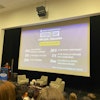Women remain concerned with underrepresentation and gender bias within science, technology, engineering and mathematics (STEM) related fields, according to new research.
The Michigan Council of Women in Technology (MCWT) study titled, “Explore, Focus and Grow: A Technology Career Journey in Michigan,” aimed to understand females’ motivations and interests in pursuing a career in STEM fields as well as challenges associated with it.
Researchers interviewed around 500 females for the study. They included girls in grades 5-8 who were attending summer technology camps, female university students, professional women and HR professionals.
“Our goal is to provide actionable insights to parents, educators, tech executives, companies and HR professionals about the value of a tech career,” said Chris Rydzewski, executive director at MCWT. “How to nurture girls to pursue their interest in technology, how to support those same girls on their paths to a tech career and perhaps most important, how to level the playing field by addressing their concerns.”
According to the research, despite more than 50% of the population being female, women have only 24% of STEM jobs and less than 20% representation in technology jobs. Additionally, a girl’s interest in technology is typically lost between the ages of 11-15.
In addition to bias and lack of representation, 23% of female university students also lack confidence in their abilities. There are also concerns surrounding pay equity and being valued as an equal coworker or leader.
“While many professional women express satisfaction with their career choice and university students express enthusiasm about their future, a perception that they will not be equally valued could prevent more young women from entering the field,” the report said.




















